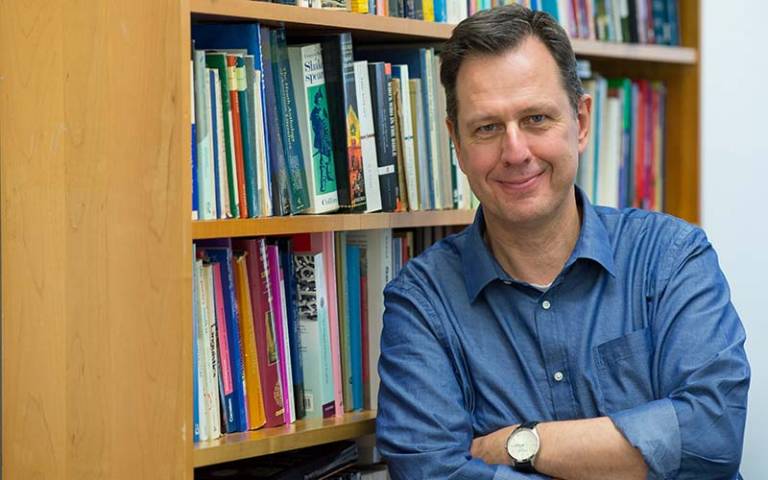Making English grammar inspiring and rewarding for school teachers and pupils
UCL Professor of English Linguistics Bas Aarts and his team have developed a suite of innovative digital and print materials for teaching grammar in schools.

18 June 2019
Professor Bas Aarts teaches English linguistics to undergraduate and postgraduate students at UCL. He’s also Vice-Dean (Enterprise) for UCL’s Faculty of Arts & Humanities and has a track record of taking his research and teaching to a wider audience outside of higher education.
For example, with UCL Innovation & Enterprise, Bas developed two short courses to support teachers’ continuing professional development (CPD), called ‘English grammar for teachers’ and ‘Teaching English grammar in context’.
English grammar stages a comeback
Bas is the Director of a unique research unit at UCL, the Survey of English Usage, which comprises a large collection of authentic English language data, both spoken and written.
“A few years ago, I began to think about how we might use that resource in some way that could be useful outside of the university,” Bas says, adding: “Sometime later, the government introduced a new national curriculum which incorporated a lot of grammar teaching, so things started to fall into place and the seed of an idea developed.”
English grammar had largely been absent from the curriculum since the 1960s, in part because at that time it was seen to be a hindrance to creativity. It was then reintroduced in 2014 in an effort to address falling levels of child literacy. The 50 year hiatus meant that many teachers felt ill-equipped to deliver grammar teaching effectively.
“It's really understandable that if you’ve never been taught grammar and you have to suddenly teach it yourself, it’s very scary. So the idea formed to develop this website that supports teachers with lesson plans and exercise materials to teach grammar in an engaging way.”
New approaches to teaching grammar
So far, more than 8,000 teachers have signed up to the free Englicious website, and are now able to deliver engaging grammar lessons to hundreds of students every week.
One of Bas’ guiding principles throughout the project has been to impart his own passion for grammar. This includes countering perceptions that grammar teaching is only about instilling language discipline, memorising reams of grammar rules and doing dry exercises.
“There’s still some resistance to teaching grammar among teachers, which I feel is understandable, but really unnecessary, because if you do it using technology, games and interactivity it can be fun and engaging for pupils and extremely rewarding for teachers.”
The interactive whiteboard games that Englicious has developed have proved particularly popular with teachers and students. For example, one interactive lesson allows you to position and rearrange words from a jumbled selection, with the aim of creating innovative noun phrases.
“Kids love putting together wacky noun phrases such as ‘every delicious elephant on the desk,’ which has pupils in stitches of laughter, and helps them learn about how noun phrases work in a fun way,” Bas says.
Commercialisation and future directions
Bas has also been able to market printed Englicious materials directly to schools with the help of UCLB (UCL’s commercialisation company, part of UCL Innovation & Enterprise). These include a ‘knowledge organiser’ (which contains foldable charts of information), flash cards, and wall posters. These are available on the UCLB XIP (express licensing) website, as well as through a licensing agreement with the education supplier TTS.
Following a focus group with teachers and a large survey of Englicious users, the website was recently redesigned and updated to improve the user journey. Bas now hopes to expand that user base, potentially in partnership with an outside commercial company or social enterprise.
In addition, Bas is working with colleagues at IOE, UCL's faculty of education and society, on a two-year project funded by the Nuffield Foundation. This will assess and validate the Englicious approach to teaching grammar, specifically to see whether it improves children’s writing at Key Stage 1 (ages 5 to 7).
“In the long term, if young people know how to use language well, in both spoken and written form, there’s almost nothing more valuable than that when it comes to applying for jobs and interviewing.”
Taking research to a wider audience
As a Vice-Dean (Enterprise), Bas encourages colleagues to consider the potential wider impact of their work, particularly those in the arts and humanities who might not always be aware of how enterprising activities could be relevant to them.
“It’s true that it can be a large investment of time and you have to have a certain passion and drive, but for me, it’s been a rewarding extra dimension to my work, different from my normal teaching and research, which I’ve really enjoyed.”
The funding that enabled Englicious
Bas and his team secured early-stage funding from the Arts and Humanities Research Council, and knowledge exchange funding from UCL’s Higher Education Innovation Fund (HEIF). He received support to develop Englicious from UCL Innovation & Enterprise, UCL Department of English and the Faculty of Arts and Humanities.
Watch a video about Englicious
Links
Find out more about:
Photo by Kirsten Holst.
 Close
Close

